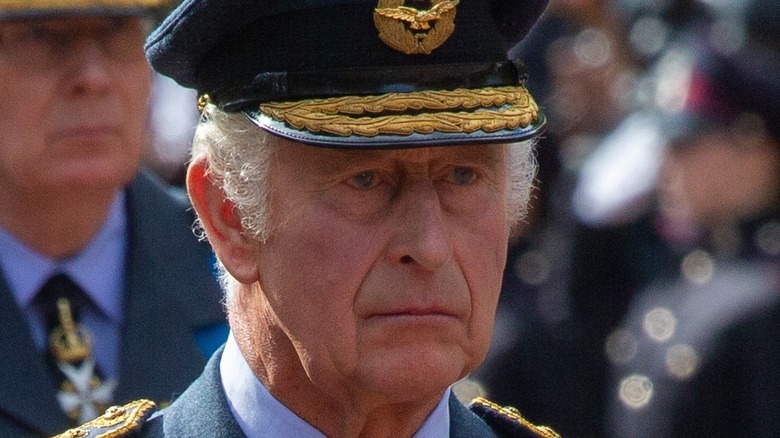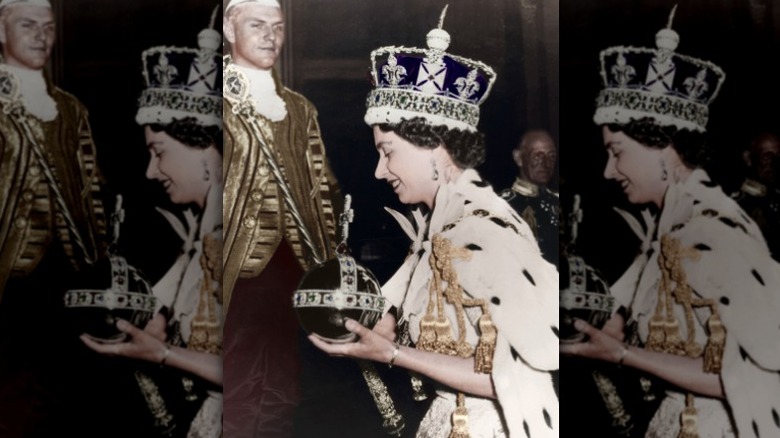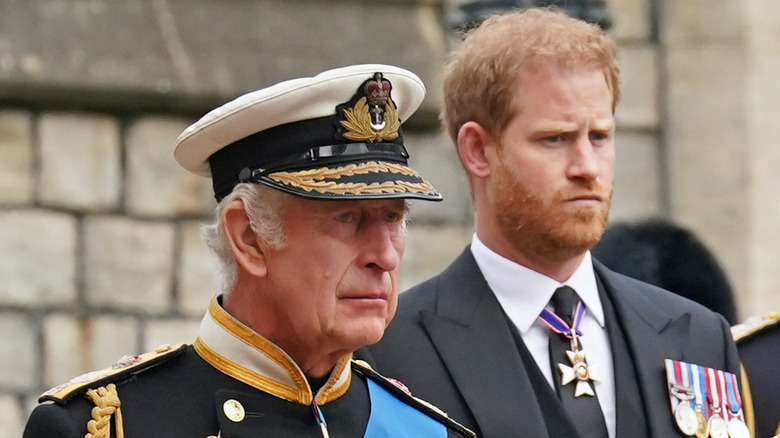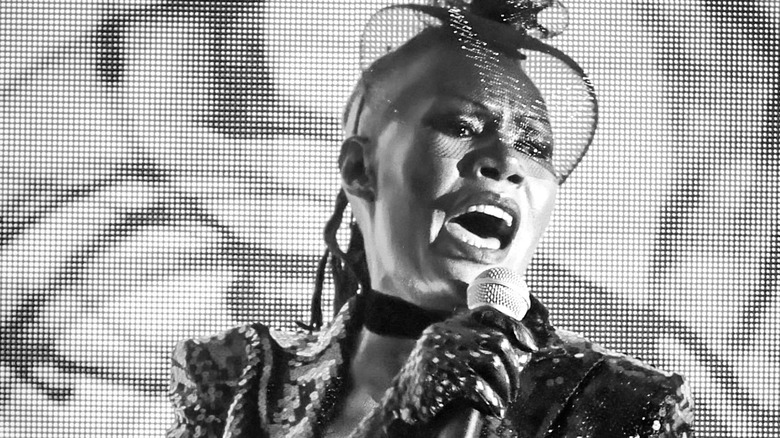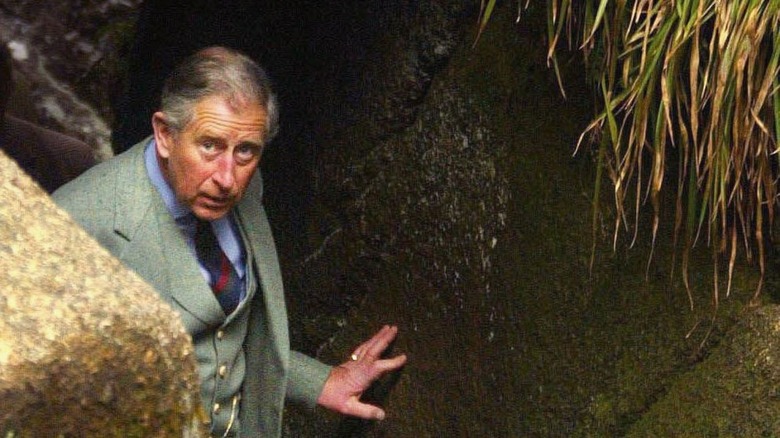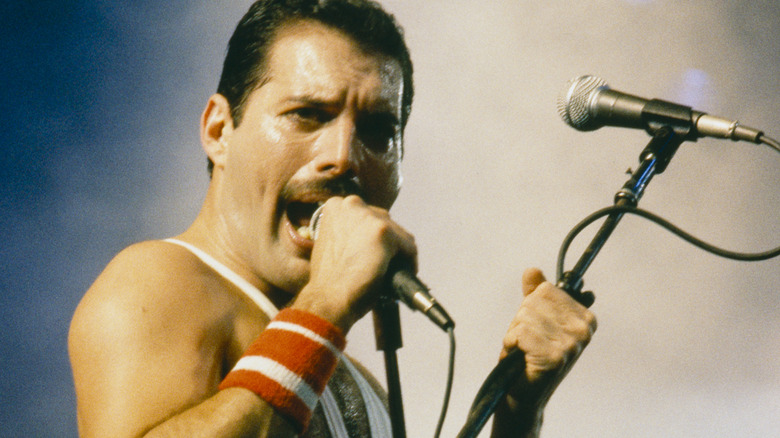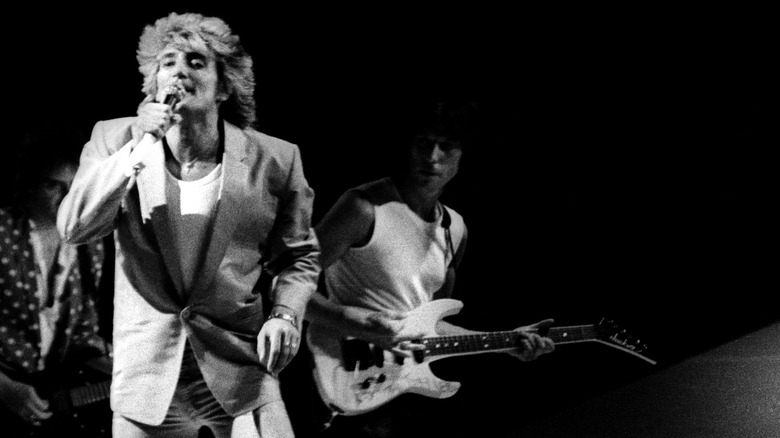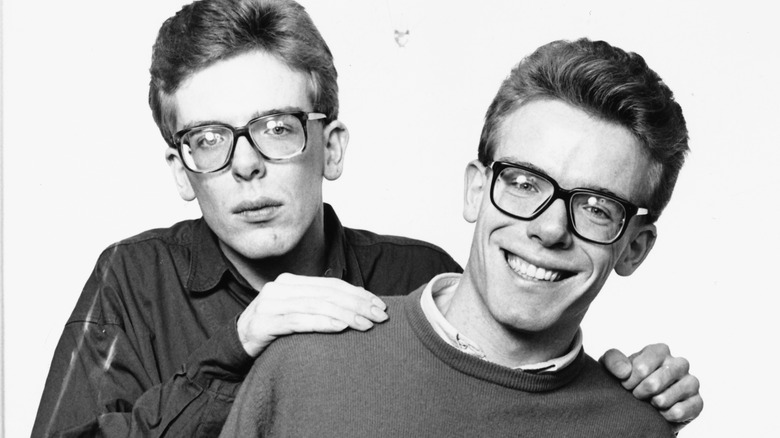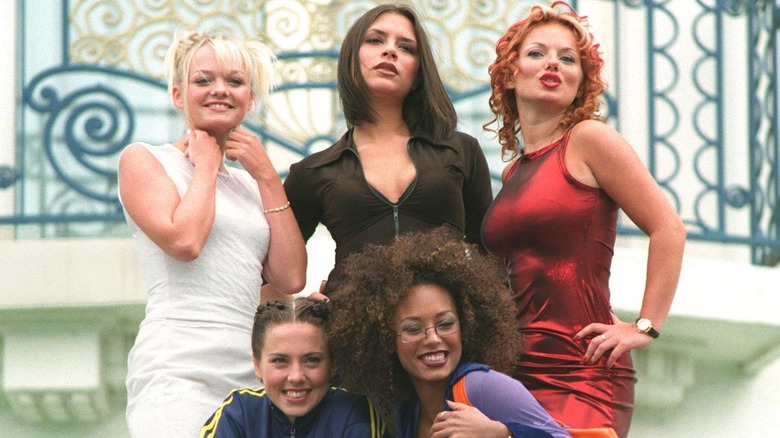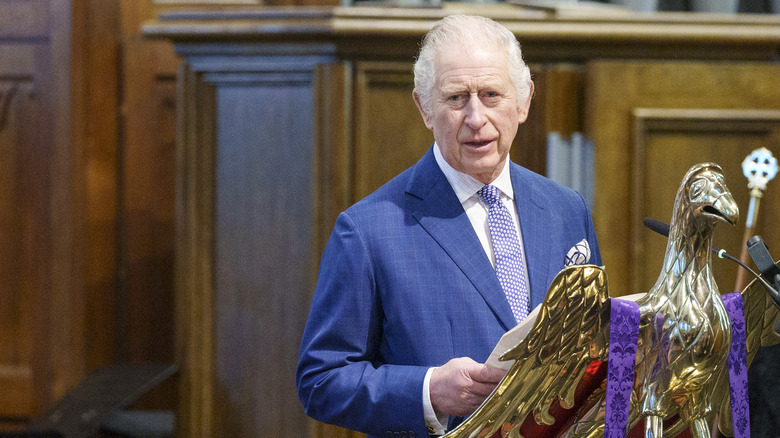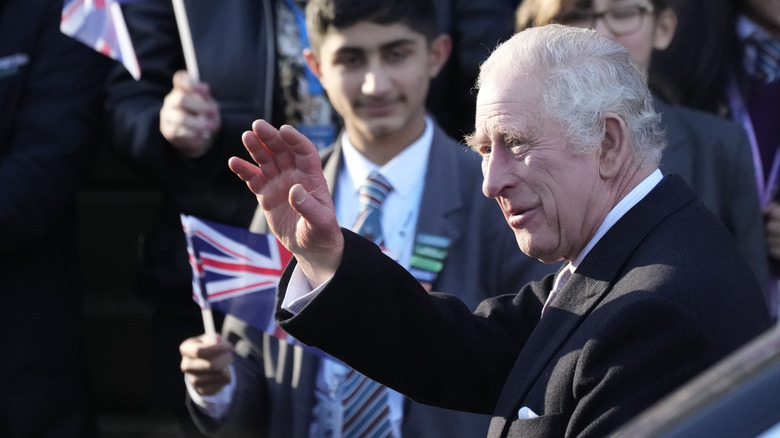Hidden Messages In King Charles III's Official Coronation Playlist
An heir to the British throne technically gains it as soon as it's vacated. But no country that holds to as much tradition and pageantry as the United Kingdom would let the beginning of a new reign go unmarked. According to The Guardian, the U.K. is the only crowned state of Europe to still mark the beginning of a new sovereign's reign with a coronation, a solemn ritual to mark a monarch's becoming head of state and head of the Church of England. Initial reports at the beginning of 2023 indicated that the crowning of King Charles III would be scaled back from past ceremonies, but even a modest coronation is an elaborate state event.
Ahead of the ceremony, scheduled for May 6, 2023, various commemorations began to be released. Among them was the Coronation Celebration Playlist, hosted on Spotify. It features 27 tracks meant to celebrate classic songs by British and Commonwealth artists in conjunction with the ceremony. But the playlist is not the work of Buckingham Palace. According to the BBC, it was created by the Department for Culture, Media, and Sport — in other words, it's the work of the government, not Charles or his office.
Still, there are selections on the playlist that seem reflective of Charles's interests and Britain's current state of affairs. The DCMS offered only minimal comment on its choices, but one can have fun speculating on what might be meant by certain songs.
The timing of the playlist's release probably wasn't a coincidence
The Department for Culture, Music, and Sport released the Coronation Celebration Playlist on February 6, 2023. The timing of the release probably wasn't a random pick from the calendar. It was likely chosen to coincide with an important anniversary for the royal family and Britain. February 6 was the day Queen Elizabeth II ascended to the throne in 1952.
As detailed by Royal.UK, under British law, accession is the automatic passing of sovereignty from one monarch to the next when the reigning king or queen dies or abdicates, with a formal proclamation by the accession council in London triggering similar public statements in Cardiff, Edinburgh, and Belfast. If the new monarch is underage or incapacitated, a regency is arranged. The coronation follows after a period of mourning for the past monarch.
Elizabeth had already taken up a share of royal duties by February 6, 1952; her father, King George VI, had been in poor health for some time. She was in Kenya on a tour of the Commonwealth on her father's behalf when he died. Her coronation took place on June 2, 1953, over a year after her accession to the throne. The gap between Charles III's accession on September 8, 2022, and his May 6, 2023 coronation sits at about eight months.
Come Together ... a nod to reconciliation?
The Beatles could be expected to have a presence in any musical playlist meant to commemorate a significant British event. The band was one of the U.K.'s great cultural exports of the 20th century. And "Come Together" was one of their most popular songs. But in light of the royal family's recent turmoil — and indeed, that of the U.K. as a whole — the opening track from the Coronation Celebration Playlist can seem more than a famous title.
The divide between the rest of the Windsors and Prince Harry, Duke of Sussex, has made headlines around the world in recent years. Harry's memoir and Netflix documentary have made public many of his issues with his father, Charles III. Whether Harry will be invited to Charles's coronation, or attend if invited, was an ongoing matter of speculation in the press. There have been anonymous reports that Charles hopes to reconcile with Harry in time for the coronation, and historian Robert Lacey told People that it was part of the job of the monarch and father to find some accord with his son.
"Come Together" might speak to that effort, but it also might be a plea for Britain to reconcile with itself. Since the Brexit vote, the U.K. has become increasingly fragmented, with positions on Brexit driving fragmentation. As head of state, Charles is meant to try and serve as a unifying force for Britain even in its most divided moments.
Three artists represent the greater Commonwealth (but is that enough?)
In releasing the Coronation Celebration Playlist, the Department for Culture, Media, and Sport told the BBC that it wanted to celebrate the work of artists from around the Commonwealth as well as Great Britain. Three of the songs on the playlist come from outside the U.K. "Daddy Cool" was performed by Boney M., a German-Caribbean band. "Slave to the Rhythm" was performed by Grace Jones, originally from Jamaica. And the cover of "It's a Beautiful Day" included on the playlist was performed by Michael Bublé, a Canadian.
Jones has past musical associations with the royal family. In 2012, she was among the artists who performed at a Buckingham Palace concert to mark Elizabeth II's diamond jubilee. She even sang "Slave to the Rhythm" on the occasion. But Jones also made a faux pas when she wished the queen a happy birthday, despite the jubilee having no connection to that date.
Jones, Bublé, and Boney M. are three artists out of 27, and for some commentators, that wasn't nearly enough to live up to the DCMS's promise to celebrate the Commonwealth. David Mouriquand of Euro News dismissed the whole playlist as largely homogenous and out of touch with modern Britain and the diversity of race and gender available among the Commonwealth realms.
Tom Jones for morality and nature?
Before becoming king, Charles III was known for being outspoken on issues close to his heart, and caring for the natural world was among them. His environmentalism has already carried over into his time as king. Sir Jony Ive, tasked with designing a logo for Charles's coronation, drew on the monarch's love of nature to create a crown shape made of roses, thistles, daffodils, and shamrocks, all plants representing the different nations of the United Kingdom (per the BBC).
Perhaps Charles's affection for the natural world was on the minds of the DCMS staff when they were preparing the Coronation Celebration Playlist. "Green, Green Grass of Home," as performed by Welsh singer Tom Jones, is not an environmental song, nor has it been famously repurposed as one. But besides the titular grass, the lyrics mention the shade of an oak tree in an idyllic town setting. Maybe that made the song seem a good fit for an eco-minded king.
Or maybe the song's brooding on mortality at the end seemed more appropriate. "Green, Green Grass of Home" is ultimately a song about a man looking back to happier days as he nears the end of his life. At 73, Charles comes to the throne advanced in years. And as a head of state with a prescribed role, the price of the crown is stepping back from the more outspoken advocacy he practiced as heir. Charles acknowledged both facts in his first address as king.
Queen offers patriotism and a tribute to Elizabeth
Could Queen have been chosen for the Coronation Celebration Playlist purely on the basis of their name? Probably not; they're among the most internationally beloved groups to come out of Britain. But Elizabeth II was also an endearing representation of Britain the world over, and her reign lasted over 70 years (per the BBC). Until her death in September 2022, she was the only monarch in living memory for most Britons. Even a playlist meant to commemorate the coronation of the next sovereign might want to find a way to pay tribute to the last.
Queen's own position in modern culture mustn't be overlooked either. Besides the enduring popularity of many of their songs, the band received fresh attention through the 2018 biopic "Bohemian Rhapsody." While subject to mixed reviews, the film became the most successful biopic in history and won four Academy Awards.
The Queen song chosen for the playlist was "We Are the Champions," among the most widely played in the band's discography. It's become a favorite sports song over the years, but its broadly proud and optimistic lyrics make it suitable for a number of celebrations. Perhaps it was felt that the song could speak to patriotic zeal and Britain's moving forward under a new reign.
People Get Ready (for a new reign)
Charles III had a long time — 70 years, in fact — to consider how he might want to reign as king. As Elizabeth II grew older and Charles and Prince William began assuming more royal duties, reports and rumors about the future of the monarchy began to circulate. Common among these claims was that Charles wished to see the institution streamlined. Under these plans, the only full-time members of the royal family besides the monarch would be the heir apparent and their spouse, and the third in line and their spouse.
Some of these claims may have been premature. Not long after Queen Elizabeth II's death, the Daily Mail, citing anonymous sources, reported that the scandals of Prince Andrew and the departure of Prince Harry from Britain had scrambled any plans for cutting back the number of working royals. Of course, nearly all reports on Charles' plans for the monarchy have come from anonymous sources, and earlier claims in more respected outlets indicated that the move to a smaller working unit would be a gradual one.
The monarchy has made some changes under Charles. Plans for the coronation ceremony have significantly cut down its length and attendance. "People Get Ready," originally by The Impressions, was a spiritual tune about moving on to the afterlife. But its title and the rendition by Jeff Beck and Rod Stewart featured on the coronation playlist might also encourage listeners to prepare for more changes down the road.
The Proclaimers acknowledge Scotland and the monarchy's reach
For those unfamiliar with The Proclaimers' politics, their inclusion on a playlist intended to mark the coronation of a new British king may not seem unusual. They're a popular Scottish rock duo, giving representation to one of the four nations of Great Britain. And the specific song chosen — "I'm Gonna Be (500 Miles)" — is their most famous.
But The Proclaimers have been very outspoken through the years about Scotland's place in the United Kingdom. They've advocated for Scottish independence from the beginning of their career. To that end, the brothers have supported the Scottish National Party and the Alba Party, and they've been unsparing in their comments about England and the idea of Britain. In a 2002 interview with Elsewhere, they coupled their pro-independence stance with republicanism. "It's almost like seeing an old friendly dog needing to be put out of its misery," Charlie Reid said of the monarchy.
"I'm Gonna Be (500 Miles)" made the Coronation Celebration Playlist despite The Proclaimers' stance on king and country. Compared to some of the duo's more overtly political material, "I'm Gonna Be" is a straightforward love song. And all its talk of traveling might speak to the British monarchy's extensive engagements and international reach, developed over decades by Elizabeth II and set to continue under Charles III.
There's past history between Charles and the Spice Girls
The Spice Girls were one of the most successful musical acts to emerge from England in the 1990s. Their songs were closely associated with the Cool Britannia movement, and their comments and off-stage exploits filled reams of tabloids. Despite sometimes provocative statements and a large critical backlash, the group's star was bright enough in 1997 that they were asked to perform for the Prince's Trust, the charity established by then-Prince Charles.
In a contemporary interview with Rolling Stone, Geri Halliwell claimed to have pinched Charles' bottom. "I pinch everyone's bottom," she insisted. She and the other Spice Girls said that they pushed past royal protocol in joking with the prince, who they said took it all in good fun. They even got comedian Stephen Fry in on a suggestion that Charles get an unusual piercing named after one of his ancestors. When Halliwell left the Spice Girls the following year, Charles wrote a personal message wishing her well (per the BBC).
Perhaps the Department for Culture, Media, and Sport was aware of the personal history between the king and the Spice Girls when they chose "Say You'll Be There" for the coronation playlist. Or, perhaps it was chosen for the band's fame and a title encouraging participation in a special event. Tabloid reporting suggested in early 2023 that the palace was encouraging the group to reunite for the coronation, but the claims came from anonymous sources without details.
The monarchy's religious trappings are still in evidence
In its most literal sense, a coronation is the placing of the crown upon a monarch's head, an act that probably just takes a few seconds. The pageantry surrounding the act isn't for the physical crown, but all the responsibilities donning it represents. For British monarchs, not the least of those is a duty to the Church of England. The sovereign is also the supreme governor of the church, and the coronation of a new king is an Anglican ceremony. According to the House of Commons, included in the coronation oath is a command that they act as "defender of the faith."
Charles III, like his mother before him, is a practicing Christian. But as Prince of Wales, he told Jonathan Dimbleby that he preferred exploring the spaces between different spiritual traditions over being too tightly bound to one. Of the oath he would one day have to take, he said, "I personally ... would much rather see it as 'defender of faith,' not 'the faith,' because it means just one particular interpretation of the faith." He softened his position years later but continued to advocate, along with his mother, for interfaith dialogue.
Some of the tracks on the Coronation Celebration Playlist might speak to this. A number of the titles mention stars, space, and the sky — looking heavenward, in other words. "Running Up That Hill (A Deal With God)" more overtly alludes to religion in its title and lyrics.
Does the new king hope to lift the kingdom's spirits?
A number of tracks on the Coronation Celebration Playlist have no obvious connection to Charles III's life or interests. "Our House" by Madness, "Treat People With Kindness" by Harry Styles, and "Let's Dance" by David Bowie are all upbeat tunes with easy appeal. Even tracks that might have some additional meaning behind their inclusion, like "It's a Beautiful Day," have the same sort of energy. Many of these songs express an optimistic mindset and good humor toward our fellow travelers on Earth.
To hear some pundits tell it, Great Britain is in sore need of such goodwill. In recent years, the country has often been described as falling into a state of decline that may be terminal. The pursuit of austerity following the 2008 global financial crisis, the vote to leave the European Union, and the dysfunction among the governing Conservative party as Britain's essential services buckled after the COVID-19 pandemic have all been pointed to as reasons for its poor state among first world nations.
Of course, such claims invite pushback. British historian Guy Ortolano pointed out in an article for The Washington Post that foreign reporters have said Britain was declining for over a century, only for the country to rebound. As a ceremonial head of state, the monarch can't take political action to alleviate societal woes, but they can try and lift the national mood, even through something as simple as a coronation playlist.
